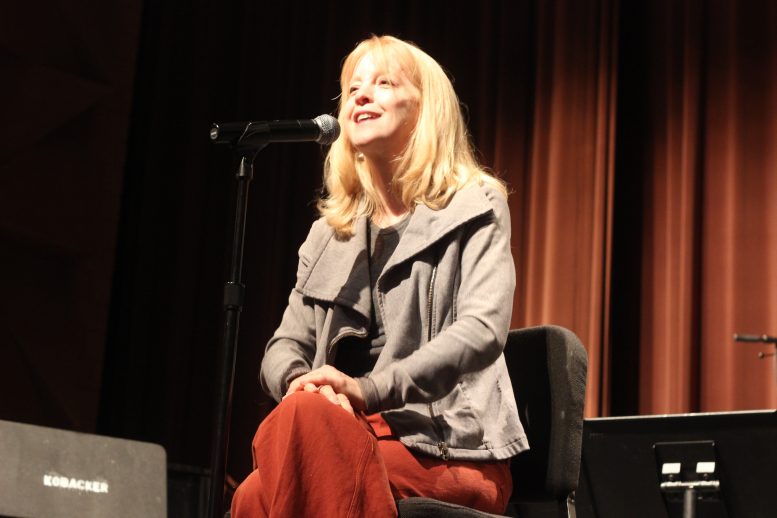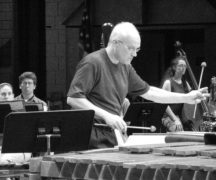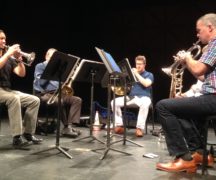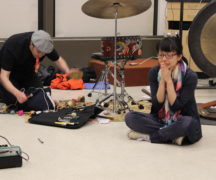By DAVID DUPONT
BG Independent News
Maria Schneider is an award-winning composer with Grammys in jazz, pop, and classical. She’s also a pioneer in crowdsourcing her music.
And she’s a champion for artists’ rights, rebelling against the current music business model.
Schneider has written about the issue, appeared on CNN, and testified before Congress. She helped launch musicanswers.org with other composers, performers, songwriters, and producers to advocate for their rights.
“I’m really doing it for your future,” she told students at Bowling Green State University, Friday in a session of digital music rights. She’s established enough that she could sit back and live off what she’s already created. Her model, ArtistShare, works well for her. Through the platform, fans help finance the $200,000 it takes to produce one of her recordings.
She makes her living from her music, but she’s concerned the new generation of musicians may not have that opportunity. “I’m really doing it for your future.”
She apologized for presenting such a bleak “outlook.”
The session came on the last day of her three-day residency at BGSU, which concluded with Schneider conducting Jazz Lab I in a concert of her music. (Click to read interview with Schneider.)
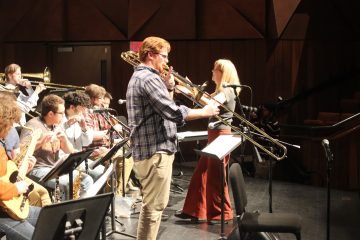
Maria Schneider conducts the BGSU Lab Band I during a rehearsal as Kyle McConnell solos on trombone.
Her outrage at the compensation started when she’d made her first recording, and found out just how little she would earn after the record company took its share. She contacted older musicians, such as Bob Brookmeyer, one of her mentors in composition, and guitarist Jim Hall. They basically shrugged in resignation.
Looking back on it, those payments were generous compared to the pittance that musicians get through the streaming model. Not surprising given Spotify was created by Daniel Ek who got his start in the illegal download business.
When he launched Spotify he needed content so he went to the three major record labels, Sony, Universal, and Warner. In exchange for 6 percent of equity in Spotify, which will go public next week, they gave Spotify the rights to their catalogs. Millions of hours of music, the work of composers and performers and producers, who would now earn almost nothing. Certainly not enough to pay for their recording sessions, which record companies now expect artists to pay for unless they sign deals to share all revenue streams.
This has been detrimental both to the download model, such as iTunes, which did provide decent income, and the sale of CDs. Only vinyl LPs are seeing an increase in sales. But the cost of shipping vinyl is prohibitive for her.
Schneider detailed her own battles to keep her music off YouTube and other free sites. Though YouTube makes it easy to download music without compensation to the creator, the process of getting that music removed, or keep it from being downloaded in the first place, is daunting, and even threatening. The burden of proof is on the copyright holder.
YouTube, Spotify, and Google want as much content up as possible to drive traffic, and gather data on users. “Data is the new gold.”
She cautioned young musicians from putting up recordings of everything on YouTube.
Her approach, she said, is to post a promotional video, with snippets of music, and commentary. However, YouTube will not allow a link to connect viewers to her ArtistShare site and buy the music, though she can mention the website in the commentary.
Schneider said she was dubious at first when Brian Camelio first suggested the ArtistShare concept in 2000. It seemed “so farfetched.” No one she thought would buy things on the internet. But Camelio told her: “The one thing you can’t file share is the creative process.”
He persisted in developing the platform, and launched ArtistShare in 2003.
Schneider was the first artist to record on it. When she announced the first project, someone in Chicago saw it and became a $1,000 supporter. That caught her attention. Then more support came in.
Working with Camelio, she developed benefits and offers to reach a variety of fans. That includes inclusive interviews and videos of the rehearsal process.
To reach her fellow jazz musicians, she offers recordings with the solo sections not included, so they can play along. She continues to do that, though it hasn’t really generated the revenue she hoped.
She also bought back all the rights to her earlier recordings. Her records would only be available through ArtistShare, not a record stores.
The idea is to have as close a relationship with her fans as possible. The person buying a CD at Tower Records is anonymous, but someone buying it through ArtistShare is not. Instead ArtistShare now has an email through which it can contact them about future projects.
In 2004 her album “Concert in a Garden” won the Grammy for the best large jazz ensemble recording.
Winning was an emotional highpoint, followed by humiliation. After receiving her award, she was ushered backstage where the press waited. Her name and award were announced, no one took notice. She moved to the second press room, expecting more apathy.
A reporter from the Minneapolis Star-Tribune approached her, and asked about the reaction of people in her hometown of Windom in southwest Minnesota. She noted in her answer that this was the first recording that was sold exclusively over the internet to win a Grammy. All of a sudden, other reporters started taking notes. The story went around the world.
That got her interviewed on CNN the first time.
The fight over rights of creators continues. The Constitution gives Congress the power: “To promote the progress of science and useful arts, by securing for limited times to authors and inventors the exclusive right to their respective writings and discoveries.”
This clashes with a culture in which people expect to get things for free, she said.
Other countries, Schneider said, are understanding the economic value of protecting intellectual property. The United States is headed in the opposite direction.
This causes damage to the bedrock of American culture. When the musicians, composers, and producers are properly compensated, they pay taxes. But there’s not much tax to pay on the little they earn from Spotify or YouTube.
“It’s not good,” she said. “It’s not fair. It’s not sustainable.”

